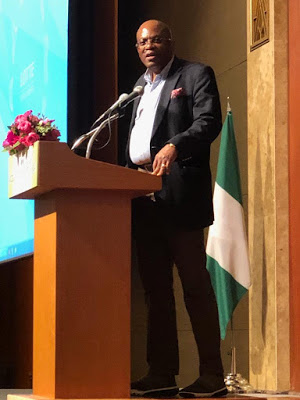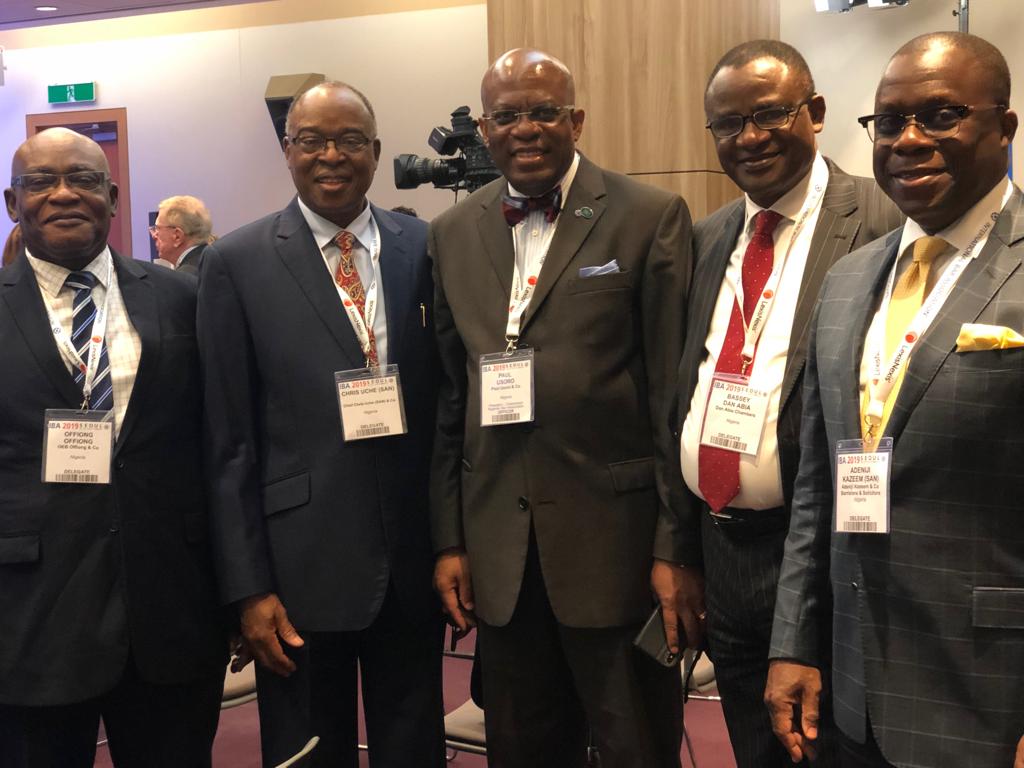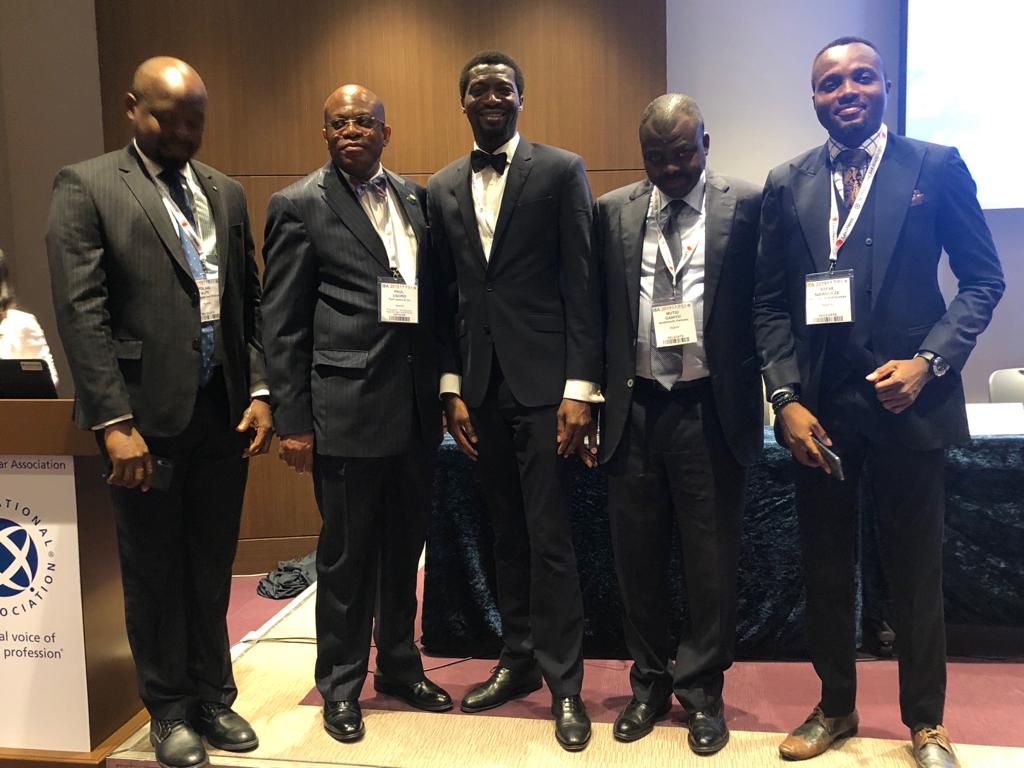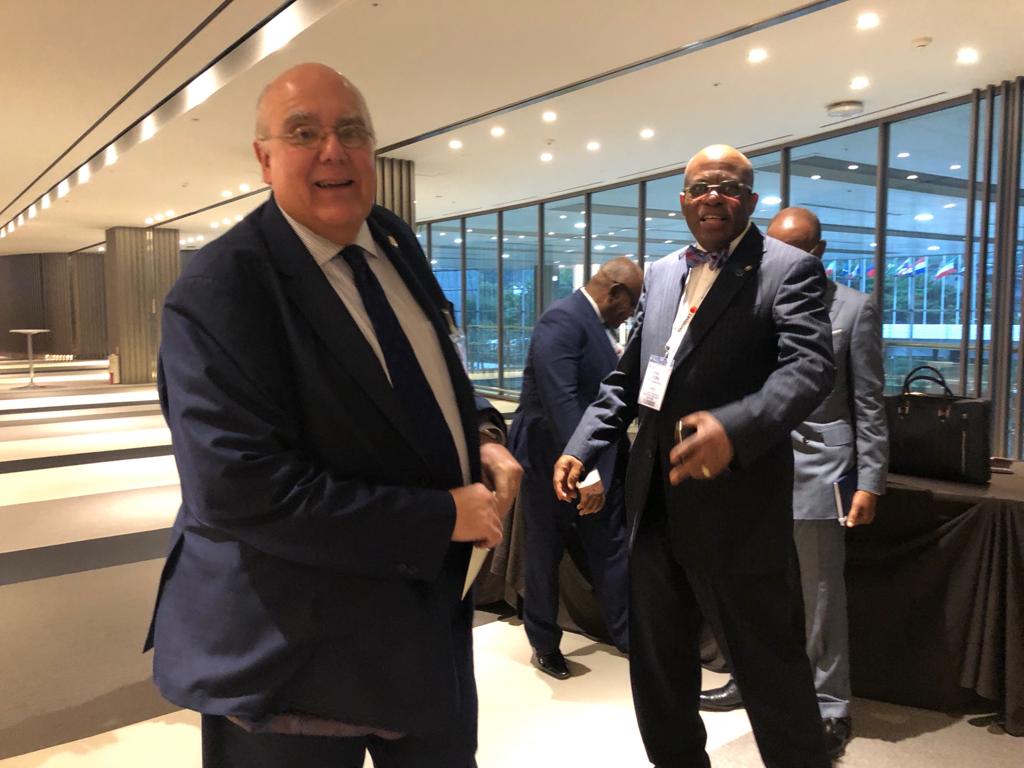
1. I had to attend the Supreme Court Legal Year Opening on Monday, 23 September 2019 and only arrived Seoul for the IBA Conference (self-sponsored) in the evening of Wednesday, 25
September 2019. I therefore attended only the Thursday and Friday, 26/27 September 2019, sessions and events. On Thursday, I attended an early morning session on Consumer Protection which featured our own Yemi Akangbe, Lagos Branch Chairman, as one of the
Speakers. He made us very proud with his elucidation on the Nigerian Consumer Protection legislation and byelaws.
September 2019. I therefore attended only the Thursday and Friday, 26/27 September 2019, sessions and events. On Thursday, I attended an early morning session on Consumer Protection which featured our own Yemi Akangbe, Lagos Branch Chairman, as one of the
Speakers. He made us very proud with his elucidation on the Nigerian Consumer Protection legislation and byelaws.

2. In the afternoon, I attended the IBA Council meeting where I represented Nigeria along with my colleagues, Jonathan Gunu Taidi, the NBA General Secretary and Konyinsola Ajayi,
SAN, both of whom I nominated at the beginning of my tenure to join me at the Council. At the start of the meeting, the IBA President, Horacio Bernades Neto, spoke most glowingly of his mission to Nigeria in August for the NBA AGC and mentioned the fact that
12,000 delegates attended the well-organized and content-rich AGC – double the number of delegates the IBA has ever had in any of its Annual Conferences. The entire Council gave us a resounding applause and that was most humbling.
SAN, both of whom I nominated at the beginning of my tenure to join me at the Council. At the start of the meeting, the IBA President, Horacio Bernades Neto, spoke most glowingly of his mission to Nigeria in August for the NBA AGC and mentioned the fact that
12,000 delegates attended the well-organized and content-rich AGC – double the number of delegates the IBA has ever had in any of its Annual Conferences. The entire Council gave us a resounding applause and that was most humbling.
3. On Friday, 27 September 2019, I attended the 3 (three) sessions of the Rule of Law Forum which ran from 9.30am to 3.30pm with short breaks for tea and lunch. The sessions focused
entirely and solely on the assaults by various regimes around the world on the independence of the judiciary, the independence of the legal profession and “best practices to address the persecution of lawyers and judges/threats to the independence of the legal
profession”. It was consoling, in some sense, to learn that the attacks on lawyers have progressed in other climes from the old and outmoded method of charging lawyers for sedition and treason to the new style of charging them for money laundering and other
such criminal acts, all in a contrived plan to cow lawyers and degrade the independence of the profession. I easily identified with that and thought wryly that EFCC did not invent the wheel after all.
entirely and solely on the assaults by various regimes around the world on the independence of the judiciary, the independence of the legal profession and “best practices to address the persecution of lawyers and judges/threats to the independence of the legal
profession”. It was consoling, in some sense, to learn that the attacks on lawyers have progressed in other climes from the old and outmoded method of charging lawyers for sedition and treason to the new style of charging them for money laundering and other
such criminal acts, all in a contrived plan to cow lawyers and degrade the independence of the profession. I easily identified with that and thought wryly that EFCC did not invent the wheel after all.
4. The Rule of Law Forum sessions ought to have been a must for all of us Nigerian lawyers – and there were actually plenty of us who attended. The sessions put in perspective the
consistent and loud protestations by the NBA against the attacks on the independence of the judiciary and the independence of the legal profession by the EFCC in particular and other government agencies and officials. In all climes, these attacks always represent
the initial symptoms of tyranny; indeed, the fabrics of democracy and freedom are gradually but consistently and indubitably destroyed when the independence of the judiciary and the independence of the legal profession are attacked and eroded. Speaker after
speaker made these points and examples of these attacks around the world were also shared.
consistent and loud protestations by the NBA against the attacks on the independence of the judiciary and the independence of the legal profession by the EFCC in particular and other government agencies and officials. In all climes, these attacks always represent
the initial symptoms of tyranny; indeed, the fabrics of democracy and freedom are gradually but consistently and indubitably destroyed when the independence of the judiciary and the independence of the legal profession are attacked and eroded. Speaker after
speaker made these points and examples of these attacks around the world were also shared.

5. Neri Javier Colmenares, a Philippines’ lawyer activist, identified 3 (three) methods of the attack on the independence of the legal profession. The first is physical elimination.
In Philippines, 42 lawyers and a number of judges have so far been killed under the regime of Rodrigo Duterte who, ironically is a lawyer, a former State Prosecutor and Colmenares’ Law School classmate. The second strategy is the weaponizing of the law i.e.
the use of law as a weapon of assault. Colmenares, for example, was charged for kidnapping and others have been charged for money laundering and such other crimes. The third assault strategy is the public vilification/media trials of lawyers and the judiciary.
Sometimes, these public vilifications pave the way for physical elimination. Clearly, we have been and are experiencing the second and third strategies in Nigeria; we need to fend these off before it degenerates to physical elimination of lawyers.
In Philippines, 42 lawyers and a number of judges have so far been killed under the regime of Rodrigo Duterte who, ironically is a lawyer, a former State Prosecutor and Colmenares’ Law School classmate. The second strategy is the weaponizing of the law i.e.
the use of law as a weapon of assault. Colmenares, for example, was charged for kidnapping and others have been charged for money laundering and such other crimes. The third assault strategy is the public vilification/media trials of lawyers and the judiciary.
Sometimes, these public vilifications pave the way for physical elimination. Clearly, we have been and are experiencing the second and third strategies in Nigeria; we need to fend these off before it degenerates to physical elimination of lawyers.
6. The question was asked, why do these intolerant regimes attack lawyers? Two reasons were advanced: first, they attack us for who we are i.e. lawyers who defend the rights of people.
In other words, simply by being lawyers, we are endangered. Second, they attack some of us for the causes we take on and, in this category, fall human rights activists and other lawyers who represent persons that are persecuted by regimes and in the process
expose the ugly underbelly of these regimes. Intolerant and autocratic regimes, it was pointed out, tend to ascribe the alleged crimes of the clients to the lawyers, believing without any basis that the lawyer and his client represent birds of the same feather.
This is one form of criminalization of law practice, with lawyers being criminalized solely because they defend clients who may not be in good standing with the regime. It was also highlighted that the attack on the independence of the legal profession always
constitutes an indirect attack on and degradation of the independence of the judiciary. It is only the Bar that can fight for the independence of the judiciary and therefore an emasculation of the Bar through attacks on the independence of the legal profession
results in the direct erosion of the independence of the judiciary, it was pointed out.
In other words, simply by being lawyers, we are endangered. Second, they attack some of us for the causes we take on and, in this category, fall human rights activists and other lawyers who represent persons that are persecuted by regimes and in the process
expose the ugly underbelly of these regimes. Intolerant and autocratic regimes, it was pointed out, tend to ascribe the alleged crimes of the clients to the lawyers, believing without any basis that the lawyer and his client represent birds of the same feather.
This is one form of criminalization of law practice, with lawyers being criminalized solely because they defend clients who may not be in good standing with the regime. It was also highlighted that the attack on the independence of the legal profession always
constitutes an indirect attack on and degradation of the independence of the judiciary. It is only the Bar that can fight for the independence of the judiciary and therefore an emasculation of the Bar through attacks on the independence of the legal profession
results in the direct erosion of the independence of the judiciary, it was pointed out.
7. Vigilance, we were reminded, must be our watchword, as lawyers and we must consistently speak out and loudly too whenever these attacks occur. Also important was the point made
by Baroness Helena Kennedy, QC, the Executive Director of the IBA Human Rights Institute, to the effect that no lawyer should consider himself safe, not even the commercial lawyers. In other words, the attack on the independence of the legal profession is
not limited to attacks on human rights lawyers but extends to all of us – including those of us who may feel secure in our commercial law practice cocoon – and it was in that context that she mentioned instances that commercial lawyers are now being hauled
to court for trial on trumped up charges of money laundering. I truly identify with that.
by Baroness Helena Kennedy, QC, the Executive Director of the IBA Human Rights Institute, to the effect that no lawyer should consider himself safe, not even the commercial lawyers. In other words, the attack on the independence of the legal profession is
not limited to attacks on human rights lawyers but extends to all of us – including those of us who may feel secure in our commercial law practice cocoon – and it was in that context that she mentioned instances that commercial lawyers are now being hauled
to court for trial on trumped up charges of money laundering. I truly identify with that.
8. It was emphasized that these twin pillars of independence – independence of the judiciary and the independence of the legal profession – must be the concern of all of us, no matter
our areas of practice because the attack on the profession ultimately affects all of us. Recent events in Nigeria – i.e. the detention and harassment of lawyers – indeed bear this out. It was also pointed out at the sessions that the independence of the judiciary
and the legal profession are not for the benefit of lawyers; they are actually for the benefit of the society and this is because, once the lawyers are cowed, the fundamental right of the citizens to be represented by lawyers of their choices is destroyed
and indeed justice dispensation is threatened and decimated. These twin pillars of independence should therefore be the concern of everyone in the society and we must educate the public and raise awareness in that regard.
our areas of practice because the attack on the profession ultimately affects all of us. Recent events in Nigeria – i.e. the detention and harassment of lawyers – indeed bear this out. It was also pointed out at the sessions that the independence of the judiciary
and the legal profession are not for the benefit of lawyers; they are actually for the benefit of the society and this is because, once the lawyers are cowed, the fundamental right of the citizens to be represented by lawyers of their choices is destroyed
and indeed justice dispensation is threatened and decimated. These twin pillars of independence should therefore be the concern of everyone in the society and we must educate the public and raise awareness in that regard.

9. Solidarity and unity amongst lawyers, it was emphasized, is also key. United, it is easy for us, as lawyers to fight both for the independence of our profession and the independence
of the judiciary. United, we can fend off these attacks and incursions. It is always the plan of intolerant regimes that the lawyers be disunited and factionalized which makes it easier for them to attack both the independence of our profession and the independence
of the judiciary. We must stand together in fighting against these early signs and indicators of intolerance and tyranny. And we must sensitize the citizenry to the fact that if they succeed in silencing the lawyers, the society as a whole is in peril. There
are very rich and pungent lessons that we must all learn, as Nigerian lawyers, from the IBA Rule of Law Symposium as captured in this my Reminisces. I am also humbled seeing these issues which I have consistently raised in my numerous NBA Releases, starting
from my Inaugural Address of 31 August 2019, being articulated so forcefully at a global IBA stage.
of the judiciary. United, we can fend off these attacks and incursions. It is always the plan of intolerant regimes that the lawyers be disunited and factionalized which makes it easier for them to attack both the independence of our profession and the independence
of the judiciary. We must stand together in fighting against these early signs and indicators of intolerance and tyranny. And we must sensitize the citizenry to the fact that if they succeed in silencing the lawyers, the society as a whole is in peril. There
are very rich and pungent lessons that we must all learn, as Nigerian lawyers, from the IBA Rule of Law Symposium as captured in this my Reminisces. I am also humbled seeing these issues which I have consistently raised in my numerous NBA Releases, starting
from my Inaugural Address of 31 August 2019, being articulated so forcefully at a global IBA stage.
Paul Usoro, SAN
NBA President
